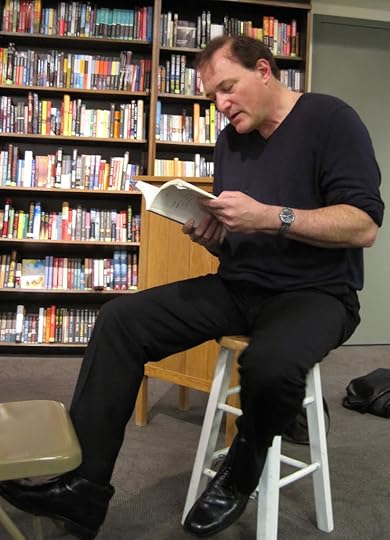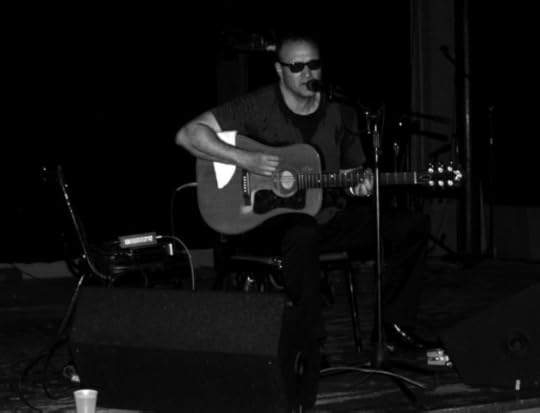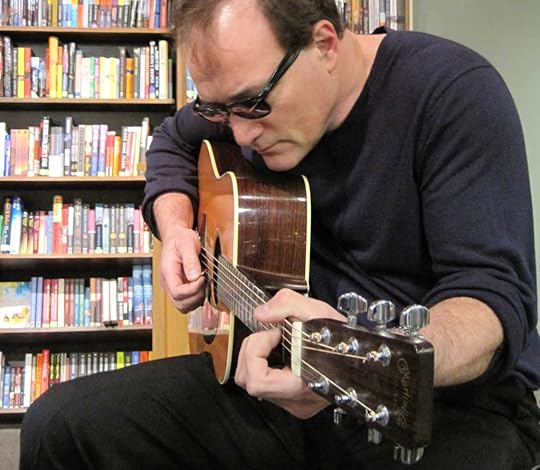Josh Alan Friedman's Blog, page 9
May 23, 2011
The Shaggs: Philosophy of the World
Theater Review Dept.: The Shaggs: Philosophy of the World
Note to WFMU listeners and our crowd: I saw the second night preview of The Shaggs: Philosophy of the World, an off-Broadway musical at Playwrights Horizons Mainstage Theater, on 42nd Street. It's a total winner. Bringing my 11-year-old daughter, I was confronted by the task of explaining why American Idol is musically and spiritually poisonous, but The Shaggs' badness is beautiful. For instance, on their 1969 LP, the drums are so neatly out of sync that you nearly have to be a musician to appreciate it. (And thus, unlike Idol, The Shaggs cult is among the musically literate.)
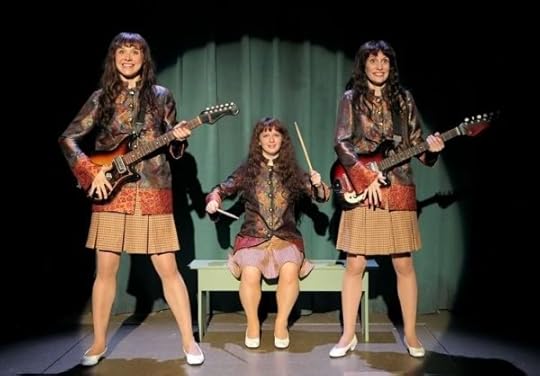 photo credit: Joan Marcus
photo credit: Joan Marcus
Philosophy has been workshopped for nine years, with earlier productions in Chicago and L.A. These days, musicals and their creators must be workshopped to death before they get a sliver of a chance for a mainstream breakthrough. This New York launch runs through June.
The Shaggs were the Ed Wood of girl groups, a band so innocently, sincerely "bad" that they inadvertently founded the category of outsider music. In the age of over-categorization, look in the "Other" bin. Defined by Irwin Chusid of WFMU, the outsider premise suggests that some cassette recording you might have surreptitiously made of your grandpa singing in the shower could become tomorrow's Number One hit record.
Philosophy's plot is driven by the Shaggs' nutjob of a dad, Austin Wiggin, played by an all-too-convincing Peter Friedman (no relation). He was their unrelenting Ed Wood-like visionary. In the late sixties, he forced his three small-town New Hampshire daughters into a band that he envisioned would become his ticket out of a banal working-class hell. Well, their father was somewhat right. Only it's slowly happening in the decades after he dropped dead of a heart attack in 1975.
The show makes ethereal use of the ascending "Twist & Shout" modulating harmonies to imply something otherworldly and spectacular was in the air. The anti-Beatles. In this case, the recording of an album that could vie for "worst" of all time. But of course, like Ed Wood films, it is not the worst, but rather something unique, singular and inspiring. Philosophy of the World, the album, was re-released in 1980 after being discovered by the band N.R.B.Q. Some descriptions over the years: "original, fearless art"; "a Dada masterpiece"; "mind-bendingly horrible" and "sufficient to disprove the philosophical structure of the modern world."
It's said the sisters were barely allowed to listen to any music growing up. So in fact, it is as if these teenage girls had to re-invent music. Then practice it for years, so that it took on its own untutored, yet highly structured teenage-girl style. You can't fashion a musical using the actual Shaggs songs themselves, so the writers created a wholly original musical around their subject, quoting fragments of Shaggs material within the score. I counted two beautiful ballads, by Gunner Madsen and Joy Gregory. Ethereal performances by the girls, as Dot, Betty and Helen Wiggin.
Philosphy of the World is a splendid take on The Shaggs' odyssey. I hope the show forges eastward on 42nd Street.
(Playing through June 2011 at Playwrights Horizons, 416 W. 42nd St. in NY.)
© 2011 Josh Alan Friedman
Note to WFMU listeners and our crowd: I saw the second night preview of The Shaggs: Philosophy of the World, an off-Broadway musical at Playwrights Horizons Mainstage Theater, on 42nd Street. It's a total winner. Bringing my 11-year-old daughter, I was confronted by the task of explaining why American Idol is musically and spiritually poisonous, but The Shaggs' badness is beautiful. For instance, on their 1969 LP, the drums are so neatly out of sync that you nearly have to be a musician to appreciate it. (And thus, unlike Idol, The Shaggs cult is among the musically literate.)
 photo credit: Joan Marcus
photo credit: Joan MarcusPhilosophy has been workshopped for nine years, with earlier productions in Chicago and L.A. These days, musicals and their creators must be workshopped to death before they get a sliver of a chance for a mainstream breakthrough. This New York launch runs through June.
The Shaggs were the Ed Wood of girl groups, a band so innocently, sincerely "bad" that they inadvertently founded the category of outsider music. In the age of over-categorization, look in the "Other" bin. Defined by Irwin Chusid of WFMU, the outsider premise suggests that some cassette recording you might have surreptitiously made of your grandpa singing in the shower could become tomorrow's Number One hit record.
Philosophy's plot is driven by the Shaggs' nutjob of a dad, Austin Wiggin, played by an all-too-convincing Peter Friedman (no relation). He was their unrelenting Ed Wood-like visionary. In the late sixties, he forced his three small-town New Hampshire daughters into a band that he envisioned would become his ticket out of a banal working-class hell. Well, their father was somewhat right. Only it's slowly happening in the decades after he dropped dead of a heart attack in 1975.
The show makes ethereal use of the ascending "Twist & Shout" modulating harmonies to imply something otherworldly and spectacular was in the air. The anti-Beatles. In this case, the recording of an album that could vie for "worst" of all time. But of course, like Ed Wood films, it is not the worst, but rather something unique, singular and inspiring. Philosophy of the World, the album, was re-released in 1980 after being discovered by the band N.R.B.Q. Some descriptions over the years: "original, fearless art"; "a Dada masterpiece"; "mind-bendingly horrible" and "sufficient to disprove the philosophical structure of the modern world."
It's said the sisters were barely allowed to listen to any music growing up. So in fact, it is as if these teenage girls had to re-invent music. Then practice it for years, so that it took on its own untutored, yet highly structured teenage-girl style. You can't fashion a musical using the actual Shaggs songs themselves, so the writers created a wholly original musical around their subject, quoting fragments of Shaggs material within the score. I counted two beautiful ballads, by Gunner Madsen and Joy Gregory. Ethereal performances by the girls, as Dot, Betty and Helen Wiggin.
Philosphy of the World is a splendid take on The Shaggs' odyssey. I hope the show forges eastward on 42nd Street.
(Playing through June 2011 at Playwrights Horizons, 416 W. 42nd St. in NY.)
© 2011 Josh Alan Friedman
Published on May 23, 2011 00:02
May 16, 2011
I'm Workin': Josh Alan on the Road
Published on May 16, 2011 00:01
May 9, 2011
I'm Workin': Josh Alan on the Road
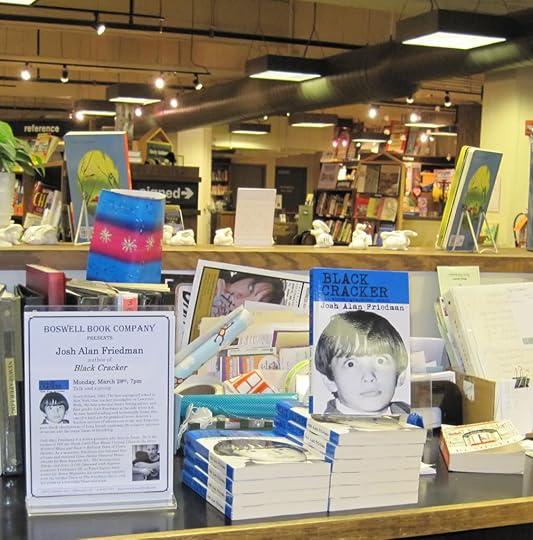 Boswell Book Company of Milwaukee welcomes Josh Alan and Black Cracker.
Boswell Book Company of Milwaukee welcomes Josh Alan and Black Cracker.photo © 2011 Barbie Brennan Nelson
Published on May 09, 2011 00:01
May 2, 2011
I'm Workin': Josh Alan on the Road
Published on May 02, 2011 00:02
April 25, 2011
I'm Workin': Josh Alan on the Road
Published on April 25, 2011 00:06
April 2, 2011
Josh Alan Live in Texas, Saturday April 9!
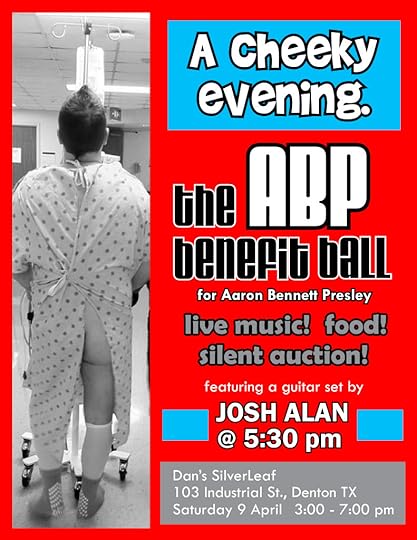 Josh Alan plays live in Texas on Saturday, April 9 at Dan's SilverLeaf in Denton. Headlining the ABP Benefit Ball for Aaron Bennett Presley, Josh's set is scheduled for 5:30 pm.
Josh Alan plays live in Texas on Saturday, April 9 at Dan's SilverLeaf in Denton. Headlining the ABP Benefit Ball for Aaron Bennett Presley, Josh's set is scheduled for 5:30 pm.Also on the bill: Foolish 2, Save the Humans for Later, NEEKS, KaiN the EverymaN. Catering by Big Fatty's. Silent auction and proceeds to help defray cancer survivor ABP's extensive medical bills.
View Larger Map
Published on April 02, 2011 00:20
March 28, 2011
On Nelson Algren
Talk given at the 22nd Annual Nelson Algren Birthday Party at the St. Paul Cultural Center in Chicago, March 26, 2011.
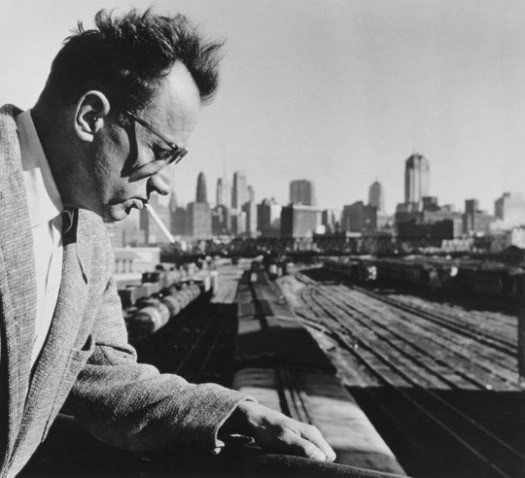 Nelson Algren. Author of The Man With the Golden Arm, A Walk on the Wild Side, Somebody in Boots, The Neon Wilderness, The Last Carousel and Chicago: City on the Make
Nelson Algren. Author of The Man With the Golden Arm, A Walk on the Wild Side, Somebody in Boots, The Neon Wilderness, The Last Carousel and Chicago: City on the Make
Sometimes I feel alone when I derive inspiration from Nelson Algren. I feel grateful, even relieved to have learned about this event. Nelson Algren has been my literary hero since I was a teenager. I love that there's an Algren "hotline" phone number.
In July 1964—I was 8 years old—my father announced, in stentorian voice, to me and my two brothers: "Boys—a Great Writer is coming to stay with us." So I wondered what a Great Writer would look like, how he might talk and dress, and how old you had to be to become such a person. It seemed like a statue was coming, some figure upon a horse.
It was Nelson Algren, of course, who my father, 34 at the time, looked upon no differently than he would have Hemingway or Fitzgerald. But my dad was friends with Algren, who'd written a couple of very good reviews of his first two books.
So one day, Nelson Algren arrived by boat to the summer house we rented in Fair Harbor on Fire Island, a thin slip of beach between Great South Bay and the Atlantic Ocean. For reference, this was the summer that A Hard Day's Night opened; it was also known as the Long Hot Summer of 1964 in the civil rights movement.
Algren was a salty middle-aged gent who carried a suitcase in one hand and an electric typewriter case in the other. Electric typewriters were new, and every morning throughout the next week, he was up at the crack of dawn, crackling at the keys of this futuristic typewriter. So he seemed like a guy at the cutting edge of technology. Little did I know. My father, a generation younger, had an old Corona.
Algren went apeshit over our elderly nanny, Mrs. Sullivan (the "Mrs. O'Leary" character in my new book, Black Cracker). She would break into a put-on Irish brogue to his delight. For years afterward, whenever Algren called my father and Mrs. Sullivan answered the phone, he'd chat with Mrs. Sullivan for an hour. Mario Puzo also spent a lot of time chatting up Mrs. Sullivan when she answered the phone. She was delighted that great writers were so taken with her blue-collar charm, and kept their personally inscribed books by her bedside.
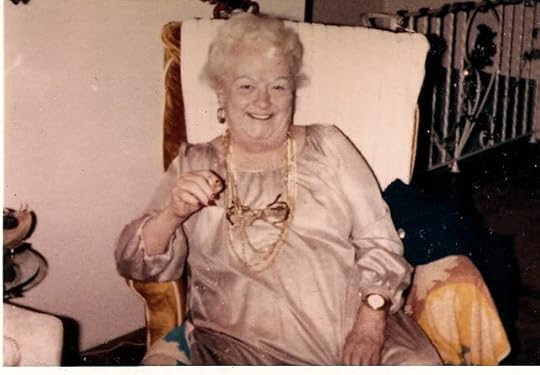 Mrs. Sullivan (who tortured me for the first ten years, then became a grand old lady).
Mrs. Sullivan (who tortured me for the first ten years, then became a grand old lady).
Another other thing I recall from that week with Nelson in the house: He advised us that the pot handles be turned inward on the stove, rather than sticking out where they could be knocked over. Simple wisdom from Nelson Algren, but something my family hadn't considered. He drank a little. My parents were crazy about him, but I think he spent more quality time gabbing with Mrs. Sullivan.
Algren greatly approved of a few younger writers, like Terry Southern and my Dad, Bruce Jay Friedman. In print, he said he admired Bruce Jay because he "didn't know what he was doing" and he was "dangerous." Calling a writer dangerous is the ultimate compliment, at least in my family. He wanted Bruce Jay to adapt Never Come Morning for the stage, and this was before my dad had ever written a play.
In the 1960s, all kinds of anti-establishment, dangerous ideas took hold in the culture, and millions of people listened and jumped aboard. Not like now. Now, there is no underground, no anti-establishment, or if there is, nobody knows about it. America is a corporatocracy, a corporate-dominated culture, with MBA degrees, corporate architecture, corporate entertainment, and millions of unquestioning kids in lockstep.
And that is why Nelson Algren remains so precious. He is not just a writer, but a Guardian Literary Angel, a Symbol, a counterweight to the corporatocracy. In his last years, he emphasized this, and I quote: "Big Business Kills." Well, maybe we need standardization and assembly lines to build automobiles, but the sphere of this domination seems so powerful and out-of-whack, it throws off the balance of life. "Big Business Kills." Those words echo in every bank bailout, every Enron and Bernie Madoff scandal that rapes a million people, every soulless concrete and glass skyscraper that uglifies the skylines of American cities.
Unlike in the past few centuries, serious writers—unless they are writers of computer games—are relegated to the bottom of the culture. Novelists are among the few citizens who actually have something to say. But they can't even command the audience of real estate developers—who are really destroyers, not developers. CEOs are today's rock stars.
Since the year that Algren died, 1981, we have become an Ayn Rand country, not a Nelson Algren nation. Imagine how different things might be if Ronald Reagan's favorite writer had been Nelson Algren—instead of Ayn Rand.
Toward the end of Nelson's life, he told my dad that "no one is interested in me." Irwin Shaw told my dad the same thing. I myself didn't have enough clout, when Algren was still alive, to get a magazine that would allow me to interview him.
Instead, it took me at least eight years to write a book called Tales of Times Square. Eight years is the amount of time Algren said it took him to write a book. I later read one of Nelson's last interviews in the 1970s, where he said if he were young now, he would be writing about and living in Times Square. In fact, several chapters of his last book, The Devil's Stocking, took place there. So with 50,000 writers living in New York, and me being the only one who bothered to write about Times Square, I felt like I had received a posthumous endorsement from Nelson Algren—my hero.
He also wrote a piece in which he was the victim of a "dry hustle" scam in a Times Square bar. I imagined him walking around Times Square like Don Quixote. This wizened street wizard. But he was hit with a $30 bar tab—which is like $75 today—after he okayed a drink for the B-girl on the adjacent barstool. Refusing to pay, Algren called their bluff. The 250-pound bouncer told him, "Pops, you come around here again, I'm going to get another old man to whip your ass."
And now, I'll play a song of mine called "Thanksgiving at McDonald's in Times Square," in his honor.
To watch on YouTube instead, click here.
© 2011 Josh Alan Friedman
To purchase your digital copy of the original "Thanksgiving at McDonald's in Times Square" single, click here.
 Nelson Algren. Author of The Man With the Golden Arm, A Walk on the Wild Side, Somebody in Boots, The Neon Wilderness, The Last Carousel and Chicago: City on the Make
Nelson Algren. Author of The Man With the Golden Arm, A Walk on the Wild Side, Somebody in Boots, The Neon Wilderness, The Last Carousel and Chicago: City on the MakeSometimes I feel alone when I derive inspiration from Nelson Algren. I feel grateful, even relieved to have learned about this event. Nelson Algren has been my literary hero since I was a teenager. I love that there's an Algren "hotline" phone number.
In July 1964—I was 8 years old—my father announced, in stentorian voice, to me and my two brothers: "Boys—a Great Writer is coming to stay with us." So I wondered what a Great Writer would look like, how he might talk and dress, and how old you had to be to become such a person. It seemed like a statue was coming, some figure upon a horse.
It was Nelson Algren, of course, who my father, 34 at the time, looked upon no differently than he would have Hemingway or Fitzgerald. But my dad was friends with Algren, who'd written a couple of very good reviews of his first two books.
So one day, Nelson Algren arrived by boat to the summer house we rented in Fair Harbor on Fire Island, a thin slip of beach between Great South Bay and the Atlantic Ocean. For reference, this was the summer that A Hard Day's Night opened; it was also known as the Long Hot Summer of 1964 in the civil rights movement.
Algren was a salty middle-aged gent who carried a suitcase in one hand and an electric typewriter case in the other. Electric typewriters were new, and every morning throughout the next week, he was up at the crack of dawn, crackling at the keys of this futuristic typewriter. So he seemed like a guy at the cutting edge of technology. Little did I know. My father, a generation younger, had an old Corona.
Algren went apeshit over our elderly nanny, Mrs. Sullivan (the "Mrs. O'Leary" character in my new book, Black Cracker). She would break into a put-on Irish brogue to his delight. For years afterward, whenever Algren called my father and Mrs. Sullivan answered the phone, he'd chat with Mrs. Sullivan for an hour. Mario Puzo also spent a lot of time chatting up Mrs. Sullivan when she answered the phone. She was delighted that great writers were so taken with her blue-collar charm, and kept their personally inscribed books by her bedside.
 Mrs. Sullivan (who tortured me for the first ten years, then became a grand old lady).
Mrs. Sullivan (who tortured me for the first ten years, then became a grand old lady).Another other thing I recall from that week with Nelson in the house: He advised us that the pot handles be turned inward on the stove, rather than sticking out where they could be knocked over. Simple wisdom from Nelson Algren, but something my family hadn't considered. He drank a little. My parents were crazy about him, but I think he spent more quality time gabbing with Mrs. Sullivan.
Algren greatly approved of a few younger writers, like Terry Southern and my Dad, Bruce Jay Friedman. In print, he said he admired Bruce Jay because he "didn't know what he was doing" and he was "dangerous." Calling a writer dangerous is the ultimate compliment, at least in my family. He wanted Bruce Jay to adapt Never Come Morning for the stage, and this was before my dad had ever written a play.
In the 1960s, all kinds of anti-establishment, dangerous ideas took hold in the culture, and millions of people listened and jumped aboard. Not like now. Now, there is no underground, no anti-establishment, or if there is, nobody knows about it. America is a corporatocracy, a corporate-dominated culture, with MBA degrees, corporate architecture, corporate entertainment, and millions of unquestioning kids in lockstep.
And that is why Nelson Algren remains so precious. He is not just a writer, but a Guardian Literary Angel, a Symbol, a counterweight to the corporatocracy. In his last years, he emphasized this, and I quote: "Big Business Kills." Well, maybe we need standardization and assembly lines to build automobiles, but the sphere of this domination seems so powerful and out-of-whack, it throws off the balance of life. "Big Business Kills." Those words echo in every bank bailout, every Enron and Bernie Madoff scandal that rapes a million people, every soulless concrete and glass skyscraper that uglifies the skylines of American cities.
Unlike in the past few centuries, serious writers—unless they are writers of computer games—are relegated to the bottom of the culture. Novelists are among the few citizens who actually have something to say. But they can't even command the audience of real estate developers—who are really destroyers, not developers. CEOs are today's rock stars.
Since the year that Algren died, 1981, we have become an Ayn Rand country, not a Nelson Algren nation. Imagine how different things might be if Ronald Reagan's favorite writer had been Nelson Algren—instead of Ayn Rand.
Toward the end of Nelson's life, he told my dad that "no one is interested in me." Irwin Shaw told my dad the same thing. I myself didn't have enough clout, when Algren was still alive, to get a magazine that would allow me to interview him.
Instead, it took me at least eight years to write a book called Tales of Times Square. Eight years is the amount of time Algren said it took him to write a book. I later read one of Nelson's last interviews in the 1970s, where he said if he were young now, he would be writing about and living in Times Square. In fact, several chapters of his last book, The Devil's Stocking, took place there. So with 50,000 writers living in New York, and me being the only one who bothered to write about Times Square, I felt like I had received a posthumous endorsement from Nelson Algren—my hero.
He also wrote a piece in which he was the victim of a "dry hustle" scam in a Times Square bar. I imagined him walking around Times Square like Don Quixote. This wizened street wizard. But he was hit with a $30 bar tab—which is like $75 today—after he okayed a drink for the B-girl on the adjacent barstool. Refusing to pay, Algren called their bluff. The 250-pound bouncer told him, "Pops, you come around here again, I'm going to get another old man to whip your ass."
And now, I'll play a song of mine called "Thanksgiving at McDonald's in Times Square," in his honor.
To watch on YouTube instead, click here.
© 2011 Josh Alan Friedman
To purchase your digital copy of the original "Thanksgiving at McDonald's in Times Square" single, click here.
Published on March 28, 2011 00:02
March 10, 2011
BLACK CRACKER in the Midwest!
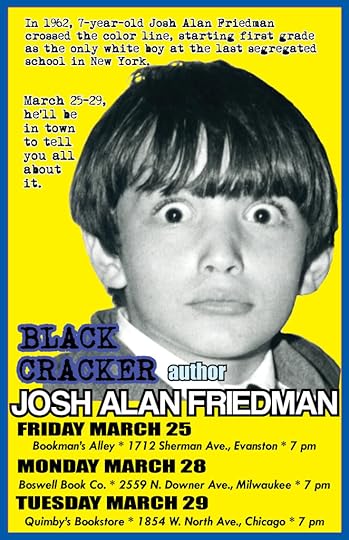 Josh Alan Friedman is bringing BLACK CRACKER to the Midwest in a big way, making four appearances in Illinois and Wisconsin this month. (Click on city names in for full details of each event, including maps and driving directions.)
Josh Alan Friedman is bringing BLACK CRACKER to the Midwest in a big way, making four appearances in Illinois and Wisconsin this month. (Click on city names in for full details of each event, including maps and driving directions.)Friday, March 25 he'll kick things off in Evanston, at Bookman's Alley. (7 pm; free admission)
Saturday, March 26 it's on to Chicago where he'll speak at the 22nd Annual Nelson Algren Birthday Party at the Wicker Park Arts Center. (Admission: $10 at the door, $7 for seniors and students with ID)
Monday, March 28 he'll be in Milwaukee for an evening at Boswell Book Company. (7 pm; free admission)
Tuesday, March 29 it's back to Chicago, where he says farewell with a bang at Quimby's Bookstore. (7 pm; free admission)
Published on March 10, 2011 12:23
March 9, 2011
Josh Alan Friedman to honor Nelson Algren in Chicago March 26
The Nelson Algren Committee has invited Josh Alan Friedman to speak at their annual Nelson Algren Birthday Party on Saturday, March 26. The event will be held at the Wicker Park Arts Center, 2215 W. North Avenue in Chicago's Wicker Park/Bucktown neighborhood.
Festivities begin at 8 pm. Admission is $10 at the door, $7 for seniors and students with ID. Drink tickets are available to those wishing to toast Algren; complimentary snacks and door prize drawings add to the fun.
Full event details (and more on Algren) can be found on the Committee's website, here.
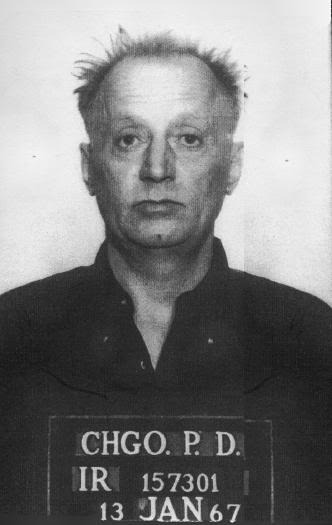 Algren's 1967 mugshot
Algren's 1967 mugshot
View Larger Map
Festivities begin at 8 pm. Admission is $10 at the door, $7 for seniors and students with ID. Drink tickets are available to those wishing to toast Algren; complimentary snacks and door prize drawings add to the fun.
Full event details (and more on Algren) can be found on the Committee's website, here.
 Algren's 1967 mugshot
Algren's 1967 mugshotView Larger Map
Published on March 09, 2011 00:04
March 8, 2011
BLACK Tuesday in Chicago March 29!
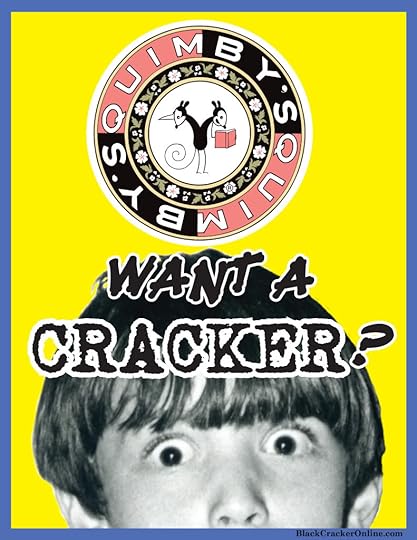 Tuesday, March 29 is Black Tuesday in Chicago as Josh Alan Friedman brings Black Cracker to Quimby's Bookstore! Join us for an evening of Quality Lit and atomic acoustic guitar starting at 7 pm.
Tuesday, March 29 is Black Tuesday in Chicago as Josh Alan Friedman brings Black Cracker to Quimby's Bookstore! Join us for an evening of Quality Lit and atomic acoustic guitar starting at 7 pm.Quimby's Bookstore is located at 1854 West North Avenue, Chicago, IL 60622
View Larger Map
Black Cracker is available NOW; signed copies are available here.
Published on March 08, 2011 00:03
Josh Alan Friedman's Blog
- Josh Alan Friedman's profile
- 22 followers
Josh Alan Friedman isn't a Goodreads Author
(yet),
but they
do have a blog,
so here are some recent posts imported from
their feed.


